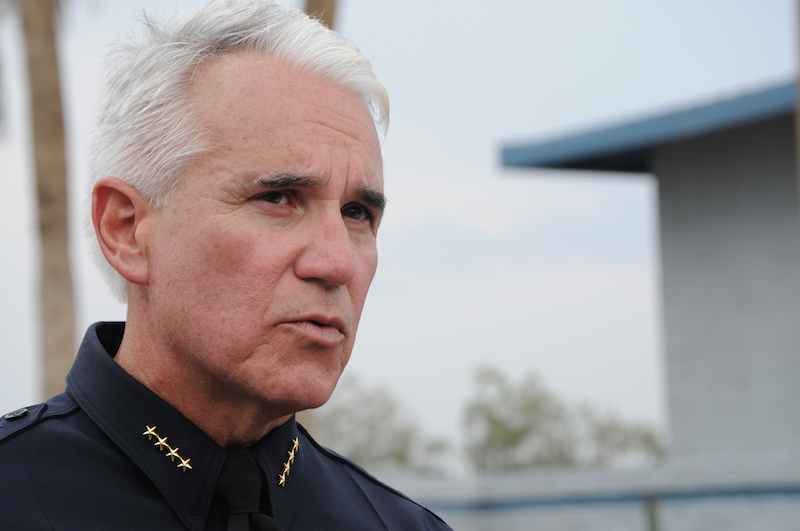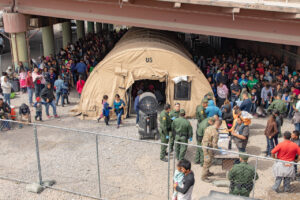Interview with City of Mesa Police Chief George Gascón, where he answers questions about policing, law enforcement agencies, the MCSO’s immigration raids, racial profiling, and the agency’s challenges and accomplishments. The interview took place in the MPD’s headquarters, in Mesa, Arizona on July 23, 2008.
You have been the Mesa Police Chief for two years. How would you describe this period in terms of goal achievement?
There are several things that… these two years have been very exciting for me. I think that they have provided a tremendous amount of opportunity for us to grow as an organization, as well as increase the level of services for our community. We have experienced significant reductions in crime overall in the last two years; approximately 15 percent of the serious crimes have been reduced in the past two years. We have increased our level of efficiency in many areas, and reduced some of the operations costs. I think we have increased our ability to work with the community; we created the community forums; we have also created community police advisory boards in each of our police stations. We have increased our interaction with the local schools in order to provide intervention programs. So there’s a whole host of things that we have done in order to improve our services. We have also increased the training that is provided to our police officers, and the organization is evolving. You know we are in difficult financial times and we are trying to look for ways to reduce our operational costs, and yet not to reduce the level of services for the community.
What have you learned about the city of Mesa that you did not know prior to your arrival?
I think by and large I was pretty familiar with the city. I did a lot of research prior to coming to the city. I understood the financial problems that the city was facing. I also knew some of the social problems that the city was encountering. So I think by and large I had a very good idea where the department was, where the city was. So there really hasn’t been many surprises.
In 2008, how is the city of Mesa a safer or more dangerous place to live or to do business?
I think the city is certainly safer. If we use crime reductions as a benchmark of what Mesa city is, is a safer place to be. The crime in the city overall is lower. In the areas where we had some issues we have improved our ability to resolve those issues. Crime clearances by detectives is higher, meaning that we have been able to determine who the people were who committed a crime, and we have been able to make the arrest on it. So overall Mesa is a safer place today than [what] it was two years ago. Now, does it mean that we are perfect? Obviously not. Do we need to continue to improve our operations? Obviously we do.
Having worked in law enforcement for three decades, what do you consider the most significant differences on how police work is done today?
I think there’s a variety of things. I think number one there, obviously, technology is different than it used to be 30 years ago. I think also the public expectation of what police services should be is very different today. There is a greater demand on what police needs to do. People expect a different level of services. The complexity of the profession has increased tremendously in the last three decades. It is much more difficult being a police officer today than it was 30 years ago.
Does the use of new technology and statistical data make police work more effective or more complex?
I think both. I think it certainly made it more effective. I think if we look especially at the crime reductions that have occurred nationwide in the last 15 years, they’re very significant, and I think that technology and statistical analysis was a tool that assists us in getting to those reductions in many cases. Obviously the more tools that you put in the bag, and the more technologically advanced that those tools are, the more complicated the work has to be.
The city of Mesa has recently approved a new policy to allow your department to ask all suspects about their legal status. What could be the advantages and drawbacks of this move?
This is a policy that has been developed over time. We have worked with a lot of different stakeholders in order to develop this policy. The policy provides an effective tool for police officers to fight crime. I think that when people are committing crimes in our city ─regardless of whether they’re here legally or not─ we need to use all the tools available to us in order to fight crime, and reduce… improve public safety. If the person is here committing crimes and also happens to be here without documents, we want to make sure that our people can avail themselves with the tools that are available in order to deal with people that are here illegally. I think the drawback in this is really something that has to do more with ourselves being able to educate the community. As soon as the people understand that the police department is here to serve every community, and if you are a law-abiding person, and the only activity that you are engaged in is crossing the border without authority, that that’s not going to be our primary focus for our department; that’ s really a federal question. On the other hand, if you are here, and you are here without authority, and you are committing crimes, certainly we are going to use those tools in order to deal with the problem.
What are your thoughts on racial profiling?
I think the issue of racial profiling is very complicated. There are constitutional questions when it comes to police involved equal protection under the law that are very complex for police to work with. I think that many times, also there is a public perception that certain behavior by the police may be acceptable. You know, people look at people and they say, well, wait a minute they look to me as someone that has committed a crime, you know, the case of immigration, if they’re brown, and they appear to be poor, they must be here illegally, and therefore why don’t you just go ahead and arrest them; and obviously we don’t get to do that. You know, constitutionally, there are some safeguards against that. Conversely, I think that sometimes people assume that because police officers make a disproportionate number of stops of one particular group, than that automatically translates that police officers must be racially profiling people, and the problem is neither one is correct. You know, sometimes officer’s activities are going to be based on many different factors, and depending on the time of the day, and depending on the part of the city, depending on the type of activity that that police officer is engaging in, he or she could disproportionately be making stops of one group that when you actually get to the bottom of all it is very appropriate. On the other hand, just because somebody has a certain physical appearance, or race, or gender, or something, does not necessarily gives the police a carte blanche to just make stops and going to a fishing expedition. So, it is complex, there are many legal concerns that sometimes are not readily visible to many people, and is an area that we have to continuously work with our people, to train police officers, and we also need to continuously work with the community to educate them in order to understand what are the constraints, and what some of this legal requirements really mean, and what are the parameters that we can work under.
In the context of undocumented immigration in the United States, can routine police work by local police departments help solve, reduce, or worsen this issue?
The illegal immigration question in our country today is much larger than anything that local policing can do. I think that the illegal immigration is driven by economics, is driven by political issues, is a legislative problem; and I think until we have a legislative solution to illegal immigration that has to come at a federal level is going to be very difficult to fix the problem. I think that anybody that believes that policing at the local level ─or quite frankly even at the federal level─ that policing can fix this, is not understanding the complexity and the legislative questions that are at hand. If you have anywhere from 12 to possibly as many as 20 million people that are here without authority on a variety of different levels, some of them crossing the border illegally and therefore committing a criminal act; someone who having crossed originally legally but then overstaying their visa and therefore committing a civil violation, and you start looking at all the different components of this, I think that it would be naive to believe that is going to be resolved through any kind of policing. Now, does [the] police has a ruling into the question? Absolutely that we do. Under the local level we have that rule when people that are here without authority or without documents are also engaging in other criminal activity. At the federal level certainly there’s other avenues including Border Patrol and some of the work that ICE does. But I think, overall, until we come up with a legislative solution to this problem, this is not going to be fixed.
Opposing and emotional viewpoints surrounded the immigration sweeps conducted by Maricopa County Sheriff Office in Mesa. What was the real essential issue you were concerned with?
You know, our focus has always been on providing for the safety of the people that live, work in the city, and certainly the safety of anyone that wanted to come in here and exercise their constitutional rights to their freedom of expression. We focus on our public safety mission; we let other agencies focus on their own missions.
When MCSO conducted immigration sweeps in the city of Phoenix, the police department did not intervene. What was the reasoning behind planning and personally supervising such an impressive operation in Mesa?
Well, we learned. Sometimes we learn from other folk’s experiences, and one of the things we noticed that occurred during the Phoenix event, as well as the one in [the Town of] Guadalupe, was that the emotions were running so high that there were very close calls in terms of people engaging in violent activity. You had demonstrators and the counter-demonstrators; you had people that were carrying weapons; people that were threatening one another. In the case of Guadalupe, we know that the sheriff actually had to move his command post after the first night of operation, because he publicly stated that he felt that the safety of the command post was jeopardized. We wanted to make sure again: we were focusing on our mission in the city of Mesa, and that should be about public safety; we wanted to make sure that public safety in Mesa was going to be protected to the extent that we could.
Would the criticism and praise about your department’s posture toward the MCSO’s operation in Mesa change your approach and methods to ensure public safety in potential volatile situations?
Yeah, no, I mean really not because, again, we… I think it’s really important for everyone to understand that we’re focusing on what we need to do in order to meet our mission, that is to provide a safe environment in the city of Mesa. We really are not focusing on anybody else’s activity; we’re only focusing our police department here responsible for providing the safety of the people in the city, what we need to do, and we basically ─based on our best knowledge of the time and the information that we had, based on my experience and that of others here─ we elected how we were going to respond to that operation. But, again, and it is really important to understand, we were focusing on our mission, not [on] anybody else’s mission.
What is your model on how law enforcement agencies should work together, and what potential consequences can arise when there’s a lack of inter-department’s cooperation?
Well, I think, you know, it is critically important for policing to communicate with one another. I think that there are a lot of things that work well when you have good inter-agency communication, and we have proven that over and over in Mesa. Here we have worked with other East Valley agencies; we’re continuously working with other federal agencies, ICE, Alcohol, Tobacco and Firearms, the Federal Bureau of Investigations, the Drug Enforcement Administration, the U.S. Marshal’s office. In working with other local agencies, we have been able to enhance our ability to deal with crime fighting, and we believe that a lot of the reductions in crime in the city of Mesa have been a direct result of those partnerships. Conversely, I think when there’s a lack of communication, I think that we all become less efficient, and I think that sometimes we actually get to jeopardize public safety if we don’t communicate well with one another.
How is your relationship with other city police chiefs around Maricopa County?
I think [it] is very high, very good. Evidence of that is that we have the Information Fusion Center that is being housed in the city of Mesa, and every other agency in the East Valley is a participant. We have a very active East Valley’s chiefs of police association. We partner regularly in many operations, so I would say that the relationship at the chief level is very good, and so is it at the working in the operation level.
What has your overall experience being the police chief in Mesa taught you until this day?
It’s taught me a variety of things. I think that I came from a much larger agency where you had a lot of resources available to use, so I had to learn how to operate obviously in a smaller environment but also not have some of the resources that I had available to me. I think that [is] also the level of experience within the agency; I came from an agency that has been operating in a large city for many, many years, so we have protocols to deal with large city problems. The city of Mesa is a city that has grown very rapidly in a very short period of time, and a lot of the protocols, and a lot of the systems that are in place were designed to deal with a much smaller environment than what we work on. So I’ve had to learn to create sometimes systems and protocols that were not there in place before. Now, clearly my experience from L.A. has helped me greatly in order to achieve those, but I have had to learn to operate at a different level than I was accustomed to.
Do you have any final remarks?
Yeah, I think that it’s important to recognize that policing is always evolving just like any other profession. Sometimes we are going to do well; sometimes we are not going to do as well. I think it’s important to learn from our mistakes and to move on, but I think if you look overall where the Mesa Police Department is today in how much has been accomplished in the last two years, you see a tremendous amount of progress. Not only measured in terms of reduction in crime, but also I think it is important to measure it in terms of community service, the communication level with many segments of the community that before felt apprehensive about coming to the police department; the fact that we are looking for ways to reduce our operational costs, and yet maintain a high level of police performance; almost by every measure that you look at our police department today we’re doing much better than what we were before. Crime is down, our clearance rate in solving crimes has increased significantly; we have reduced our overtime costs; we have increased communication level in many communities that before were not communicating as well with the police department. So I think it is important to look at all these things in total, and understand that policing is an evolving process and that we are hoping to get better every day.
Mesa Police Department website
Video: Interview with Mesa Police Chief George Gascón
© 2008 – 2023, Eduardo Barraza. All rights reserved.





